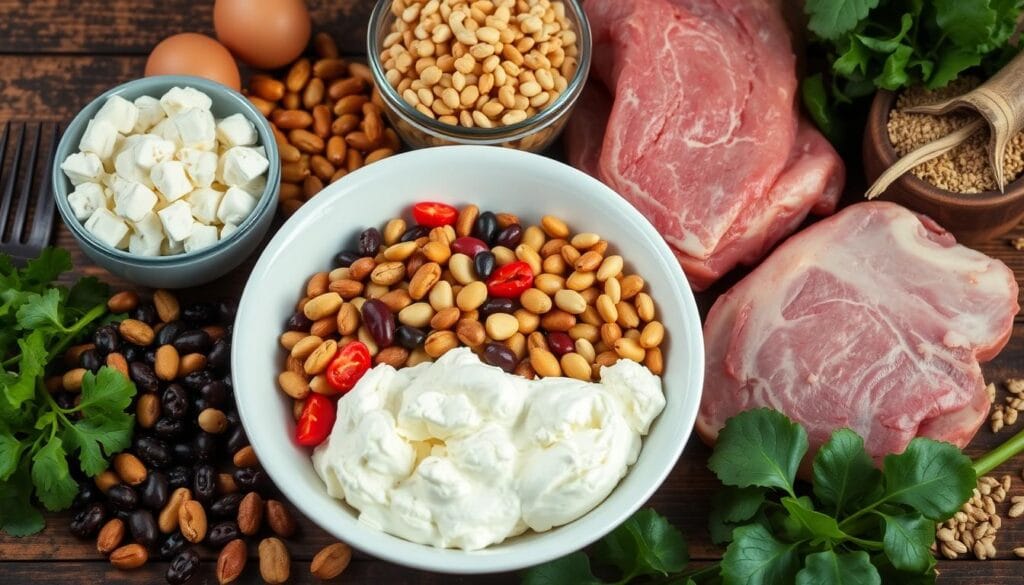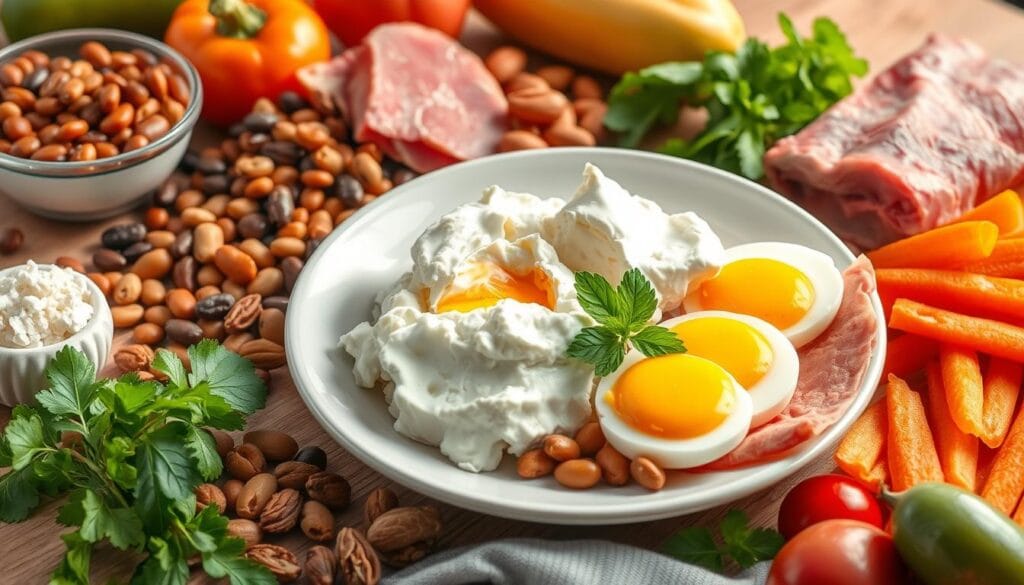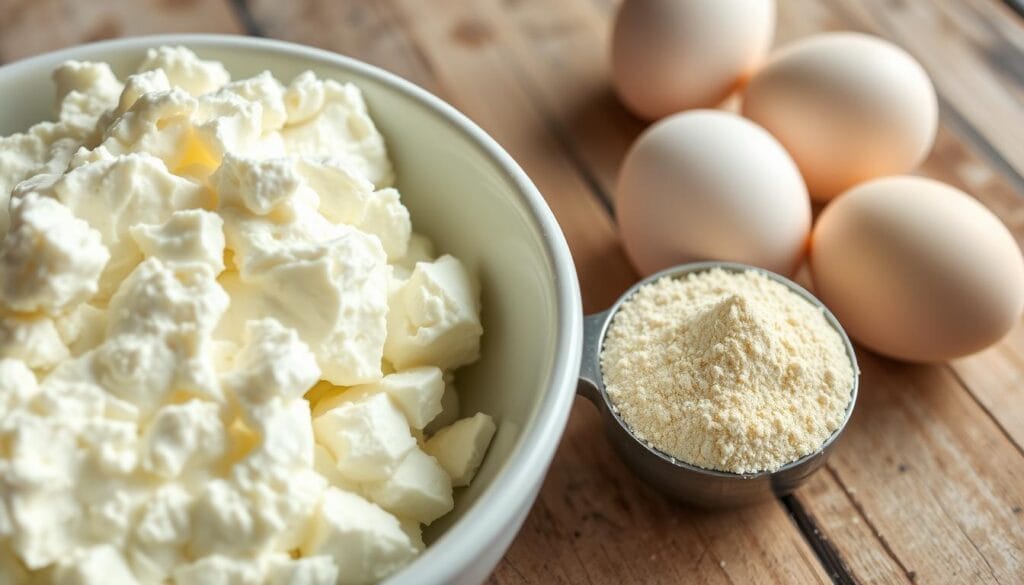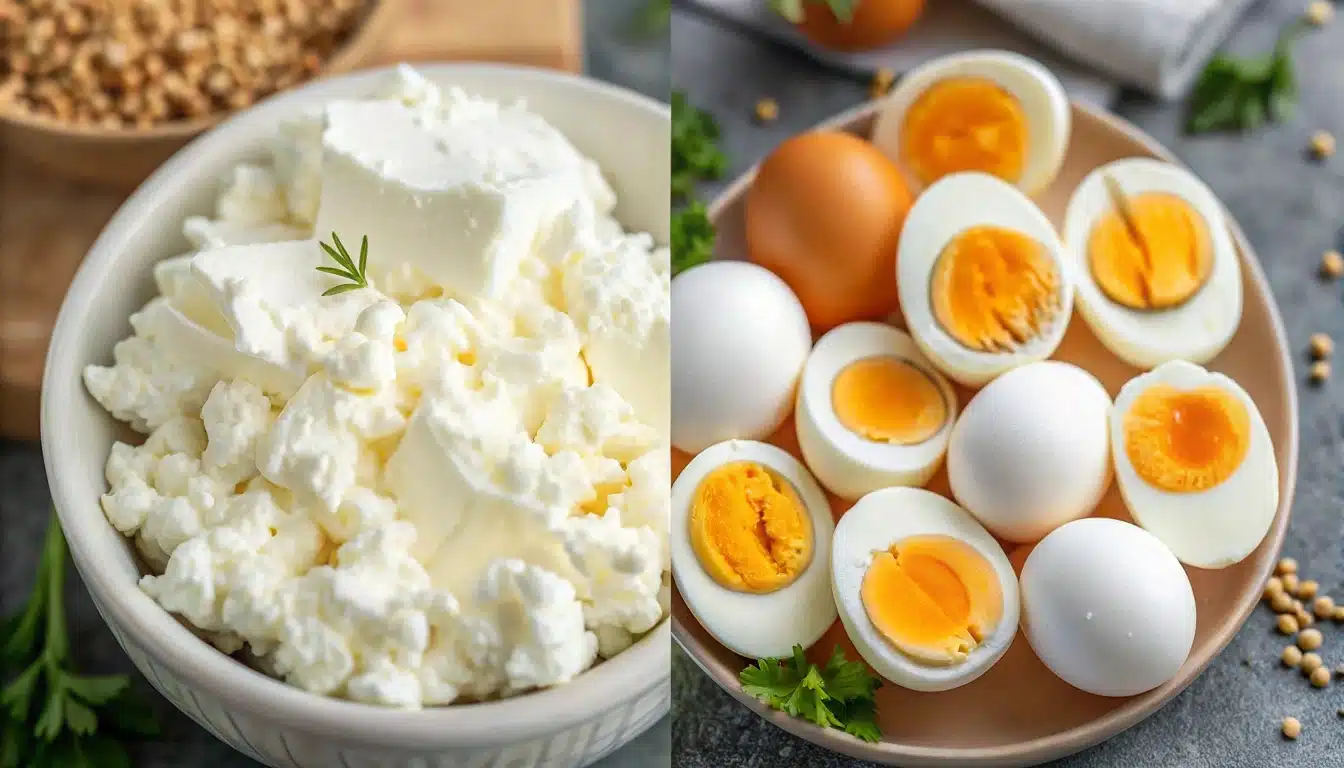Ever stood in front of your fridge, unsure which protein snack to pick? Many face this dilemma, with so many options it’s hard to know what’s best. When deciding between cottage cheese and eggs, you might ask: is cottage cheese higher in protein than eggs? Knowing the protein in these foods is key to fueling your body right.
In this article, we’ll explore cottage cheese and egg nutrition. We aim to help you make choices that meet your dietary needs.
Table of Contents
Table of Contents
Introduction to Protein Sources
It’s important to know about protein sources for a healthy diet. Proteins help fix tissues, keep muscles strong, and make you feel full. With more people focusing on health, picking the right proteins is key.
Dairy products are a top choice for proteins. For example, cottage cheese has about 13.6 grams of protein per 100 grams. Eggs also offer a lot, with about 12.3 grams per 100 grams. Adding these to your meals can boost your nutrition.
Meats like chicken and fish are also high in protein. Chicken breast has around 21.5 grams per 100 grams. For those who don’t eat meat, lentils and edamame are great plant-based options. Mixing different protein sources can meet your dietary needs and improve your nutrition.
| Protein Source | Protein Content (grams per 100 grams) | % of Total Energy Value |
|---|---|---|
| Cottage Cheese | 13.6 | 72% |
| Eggs | 12.3 | 36.7% |
| Chicken Breast | 21.5 | 58.6% |
| Lentils | 18 | 230 calories |
| Edamame | 17 | Less than 200 calories |

Understanding Protein Needs for Your Diet
Protein is key for good health and wellness. It’s important to know how much you need. Your age, how active you are, and your health goals affect your protein needs. For example, most adults need about 56 grams of protein a day.
People who are very active, like athletes, might need more protein. Eating 20-30 grams of high-quality protein at each meal helps muscles grow. Foods like chicken, fish, and Greek yogurt are great for this.
If you’re trying to lose weight, eating more protein can help. Foods like cottage cheese or eggs for breakfast can help you feel full. Here’s a list of how much protein is in some common foods:
| Food Item | Protein Content (grams) |
|---|---|
| Egg (1 medium) | 6 |
| Cottage Cheese (1/2 cup) | 12 |
| Chicken Breast (1 medium) | 36 |
| Shrimp (4 ounces) | 17 |
| Greek Yogurt (7 ounces) | 20 |
| Hemp Seeds (3 tablespoons) | 9.5 |
There are many ways to get enough protein in your diet. Whether you’re trying to build muscle or lose weight, knowing your protein needs is important for staying healthy.

How Much Protein Is in an Egg?
Knowing how much protein is in eggs is key for those watching their diet. A large egg has about 6.3 grams of complete, high-quality protein. This protein is important because it has all nine essential amino acids needed for health. Eggs are not just good for you; they also help meet your daily protein needs.
Nutrition Breakdown of a Large Egg
Each large egg has about 71.5 calories, making it a low-calorie protein source. Here’s what you get in a large egg:
| Nutrient | Amount |
|---|---|
| Calories | 71.5 |
| Total Protein | 6.3 g |
| Fat | 5 g |
| Carbohydrates | Less than 1 g |
| Fiber | Less than 1 g |
The egg white has about 3.7 grams of protein, and the yolk has 2.7 grams of protein. Eating the whole egg is best because it gives you the most health benefits and protein.
Quality of Protein in Eggs
The protein in eggs is some of the highest quality you can get. It’s among the best protein sources in food. Studies show that raw and cooked eggs have the same amount of protein, giving you the nutrients your body needs. Adding eggs to your meals can help you meet your daily protein needs, which depend on your age and how active you are.
What is the Protein Content of Cottage Cheese?
Cottage cheese is a top pick for those looking to boost their protein intake. It has about 11 grams of protein per cup. This makes it a key player in meeting your daily protein needs. Plus, it’s rich in calcium and B vitamins, all for just a few calories.
Nutrition Profile of Cottage Cheese
Cottage cheese is more than just protein; it’s a treasure trove of nutrients. A half-cup of full-fat cottage cheese packs 14 grams of protein and 116 calories. It also offers:
- 3 grams of saturated fat
- 200 mg of sodium in low-sodium varieties
- 33% of the daily requirement for vitamin B12
- 14% of the daily value for phosphorus
- 8% of the daily calcium requirement
This makes cottage cheese a favorite among those who want to up their protein game.
Cottage Cheese vs. Other Dairy Proteins
Cottage cheese stacks up well against other dairy proteins. For example, low-fat Greek yogurt has 19.9 grams of protein in 7 ounces. A large egg has 6.3 grams of protein. Canned tuna and salmon have even more protein, with 21 grams and nearly 19 grams per serving.
Compared to Greek yogurt, cottage cheese has similar protein but less fat and calories. This makes it a great choice for many diets.

Is Cottage Cheese High in Protein Than Eggs?
When looking at protein sources, it’s key to check the protein density and nutritional value. This look at cottage cheese vs. eggs shows the benefits of each for your diet.
Direct Protein Comparison
A large egg has about 6.3 grams of high-quality protein. Cottage cheese, on the other hand, has 11 grams per one-cup serving. This big difference makes cottage cheese a top choice for more protein.
Serving Sizes and Protein Density
Cottage cheese has more protein per serving than eggs. It’s not just good for recipes, but also for adding protein to your diet. Here’s a table comparing protein in different foods:
| Food Item | Protein Content |
|---|---|
| Large Egg | 6.3 grams |
| Cottage Cheese (1 cup) | 11 grams |
| Tofu (1/2 cup) | 21.8 grams |
| Salmon (3 ounces) | 19 grams |
| Chicken Breast (3 ounces) | 20-26 grams |
The protein density of cottage cheese makes it a better choice than eggs. For those wanting to eat more protein easily, cottage cheese is a great option.
Benefits of Cottage Cheese for Protein Intake
Cottage cheese is great for boosting your protein intake and helping with weight management. It’s packed with low-fat protein, which keeps you feeling full for a long time. It’s perfect for anyone who loves fitness or wants to live a healthy life.
Weight Management and Satiety
Cottage cheese has a lot of protein, which is key for managing your weight. With 12 grams of protein in just half a cup, it helps you stay full longer. This can help you avoid unhealthy snacks and stick to better eating choices.
Convenient Snack Options with Cottage Cheese
Adding cottage cheese to your diet is easy and fun, making it a top pick for healthy snacks. You can eat it on its own or mix it with fruits, herbs, or nuts for extra taste and nutrients. This way, you can make tasty snacks that also increase your protein.
Additional Nutritional Benefits of Eggs
Eggs are not just a good source of protein. They also have many essential nutrients that help your health. Knowing the vitamin benefits of eggs can help you make better food choices. Adding eggs to your meals can make your diet more balanced and flavorful.
Vitamins and Minerals in Eggs
Eggs are packed with vitamins and minerals like:
- Vitamin A: Good for your eyes and immune system.
- Vitamin D: Helps with bone health and calcium.
- Vitamin B12: Important for your nerves and blood cells.
- Selenium: Protects your cells from harm.
- Choline: Good for your brain and liver.
These nutrients are key for your body’s functions. This shows why eggs are a nutrient-rich food.
The Role of Eggs in a Balanced Diet
Eggs are great for a balanced diet. They offer:
- High-quality protein: One large egg has about 6 grams of protein, with all nine essential amino acids.
- Low-calorie option: With just 71.5 calories per egg, they’re good for weight management.
- Versatility: Eggs can be cooked in many ways, making them easy to add to any meal.
Adding eggs to your meals boosts your diet’s nutrition. It supports your health goals. Understanding the vitamin benefits of eggs helps you make informed choices for a balanced diet.
How to Incorporate Cottage Cheese into Your Diet
Adding cottage cheese to your meals can boost your protein intake. It’s creamy and versatile, fitting into both sweet and savory dishes. This makes it a great addition to many meals and snacks.
If you’re mixing eggs and cottage cheese, but ending up with watery results, here’s why that happens and how to fix it: Why Are My Cottage Cheese Eggs So Watery?
Creative Ways to Enjoy Cottage Cheese
There are many ways to enjoy cottage cheese. Blend it into smoothies for a protein-rich breakfast or snack. It’s also great in pancakes, adding a nutritious twist.
For savory dishes, mix it with eggs in frittatas or muffins. You can also make creamy dressings by blending it. This offers a healthier option compared to traditional dressings.
Not sure where to start? See The Most Popular Way to Eat Cottage Cheese for easy ideas that Americans are loving right now.
Healthy Cottage Cheese Snack Ideas
There are many healthy cottage cheese snack ideas. Here are some tasty options:
- Make cottage cheese fruit bowls with your favorite fruits and nuts for extra texture.
- Mix cottage cheese with peanut butter and vanilla for a sweet dip. Enjoy it with apple slices or whole-grain crackers.
- Try overnight oats with cottage cheese for a protein-packed breakfast with over 20 grams of protein per serving.
- Add cottage cheese to macaroni and cheese or pasta for more protein and creaminess.
- Make cottage cheese pancakes for a protein-rich breakfast with 25 grams of protein per serving.
- Create a cottage cheese dip with herbs and seasonings. It’s perfect for parties or a quick snack.
Love pancakes but want a protein-packed option? Try our Oatmeal Cottage Cheese Pancakes for a wholesome breakfast rich in flavor and nutrition.
Cottage cheese is easy to add to your meals. It helps you eat healthier while meeting your dietary needs.
| Recipe | Protein Content per Serving | Calories |
|---|---|---|
| Cottage Cheese Pancakes | 25 grams | 200 |
| Cottage Cheese Fruit Bowl | 12 grams | 150 |
| Cottage Cheese Frittata | 21 grams | 180 |
| Cottage Cheese Overnight Oats | 20 grams | 250 |
| Cottage Cheese Dip | 15 grams | 120 |
Comparing Overall Nutritional Profiles
When looking at cottage cheese and eggs, we must see more than just protein. Each food has unique benefits that can help you choose what’s best for you.
Protein vs. Other Nutrients
Eggs have about 12.6 grams of protein per 100 grams. Cottage cheese has around 11.1 grams. But, don’t just look at protein. Other nutrients are important too.
| Nutrient | Cottage Cheese (per 100g) | Egg (per 100g) |
|---|---|---|
| Calories | 98 | 143 |
| Protein (g) | 11.1 | 12.6 |
| Fat (g) | 4.3 | 9.5 |
| Carbohydrates (g) | 3.4 | 1.1 |
| Saturated Fat (g) | 1.7 | 3.1 |
| Cholesterol (mg) | 17 | 372 |
| Vitamin A (µg) | 37 | 160 |
| Calcium (mg) | 83 | 56 |
| Iron (mg) | 0.07 | 1.8 |
Cottage cheese has fewer calories and less cholesterol than eggs. It also has more calcium. Eggs, on the other hand, have more vitamins A and D. Knowing these differences helps you plan your meals better.
Dietary Considerations for Eggs and Cottage Cheese
Your diet goals can guide your choice between cottage cheese and eggs. Cottage cheese is good for those watching saturated fat or cholesterol. Eggs, with their vitamins and minerals, are great for health.
Both foods are key to a balanced diet. Your health goals will help decide which one is best for you. By comparing them, you can pick the right fit for your lifestyle and nutritional needs.
Common Myths About Protein Sources
Many people think they need a lot of protein, but this is often nutrition misinformation. They believe plant-based proteins are not as good as animal proteins. But, many plant foods can give you enough protein if you mix them up.
Online searches for high-protein foods hit a peak in 2023. This shows more people know about protein’s importance. Yet, some think they must have protein in every meal, which isn’t always true.
It’s key to know how much protein you need based on your weight and how active you are. For a 150-pound person, about 54 grams of protein a day is a good start. But, if you’re more active or older, you might need more, up to 2.4 grams per kilogram.
Knowing the truth about protein helps you make better food choices. Aim for a mix of animal and plant-based proteins. This way, you can meet your health and nutrition goals without falling for protein myths.
| Protein Source | Protein per Serving | Percentage of Total Calories |
|---|---|---|
| One Large Boiled Egg | 6 grams | 31% |
| Fage 0% Plain Greek Yogurt | 16 grams | 80% |
| Kroger Fat-Free Cottage Cheese | 13 grams | 65% |
| Cooked Black Beans (1 cup) | 8 grams | 28% |
| Chipotle Wholesome Bowl | 35 grams | 33% |
The Role of Dairy Protein in Bodybuilding and Fitness Nutrition
Dairy protein is key for bodybuilding and fitness. Foods like cottage cheese are packed with protein. This is vital for building and repairing muscles.
Experts say you need 1.4–2 grams of protein per kilogram of body weight daily. Dairy products fit this bill perfectly, making them great for your diet.
Cottage cheese has about 28 grams of protein per cup. Eggs add about 6 grams of protein each. This helps build muscles by providing essential amino acids, like leucine.
It’s important to spread out your protein intake all day. This boosts muscle growth and recovery. For example, a meal with 10 to 20 grams of protein after working out helps a lot.
Here’s a summary of protein content from various dairy and protein sources for your fitness nutrition:
| Food | Protein per Serving |
|---|---|
| Cottage Cheese (1 cup) | 28 grams |
| Greek Yogurt (1 1/2 cups) | 30 grams |
| Eggs (5 large) | 30 grams |
| Chicken Breast (3 ounces) | 26.7 grams |
| Tuna (3 ounces) | 20 grams |
| Lean Beef (1 cup cooked) | 30 grams |
Adding dairy protein to your meals helps with muscle growth and recovery. Remember to eat high-quality protein at different times of the day. This will help you reach your fitness goals.
FAQs
Is cottage cheese better for you than eggs?
That depends on your dietary goals. If you’re looking for a slow-digesting protein, low-fat option, or a food rich in calcium, cottage cheese might be better. However, eggs offer superior protein quality, more complete amino acid balance, and extra nutrients like choline and vitamin D. So while cottage cheese is high in protein than eggs by grams per serving, eggs are often considered more versatile and bioavailable.
What is a better source of protein than eggs?
While eggs are among the highest-quality protein sources, whey protein isolate, Greek yogurt, and yes—low-fat cottage cheese—can sometimes beat eggs in terms of protein-per-calorie or serving size. Still, eggs maintain one of the best biological values for protein utilization in the human body.
Which food is the king of protein?
Many nutritionists crown eggs or whey protein as the “kings of protein” because of their digestibility and amino acid profile. However, cottage cheese ranks close—especially in the case of bodybuilders and athletes seeking slow-releasing protein throughout the night.
Is cottage cheese enough protein?
Yes, a serving of low-fat cottage cheese can provide 12–15 grams of protein, making it ideal for meals or snacks. If you’re following a high-protein diet, it can easily contribute toward your daily goal. Just remember: although cottage cheese is high in protein than eggs by volume, it’s smart to combine various protein sources for optimal nutrition.
Is it okay to eat cottage cheese every day?
Absolutely. Eating cottage cheese daily is safe for most people and can support muscle growth, weight loss, and bone health. It’s low in fat (especially nonfat versions), low in sugar, and packed with casein protein. However, those sensitive to dairy or sodium should check the label before making it a staple.
What food has the highest protein?
Some of the highest-protein foods include:
- Whey protein isolate (90+g per 100g)
- Chicken breast (31g per 100g)
- Eggs (13g per 100g)
- Cottage cheese (11–14g per 100g)
While cottage cheese is high in protein than eggs in some forms, it’s best viewed as part of a balanced rotation of top-tier protein options.
Conclusion
Cottage cheese and eggs are both great for getting protein. Cottage cheese has about 28 grams of protein per cup. This is much more than what you get from one egg.
Eggs, on the other hand, are full of important nutrients like vitamin D and B12. They are also good for your bones and can help lower cancer risk. So, both are good for you in different ways.
Choosing between cottage cheese and eggs depends on what you like and need. Both can help you meet your protein goals. Adding them to your diet can make it healthier and more balanced.
By mixing cottage cheese and eggs into your meals, you get more nutrients. This helps you reach your health goals. Knowing what each offers lets you make better choices for your diet.

